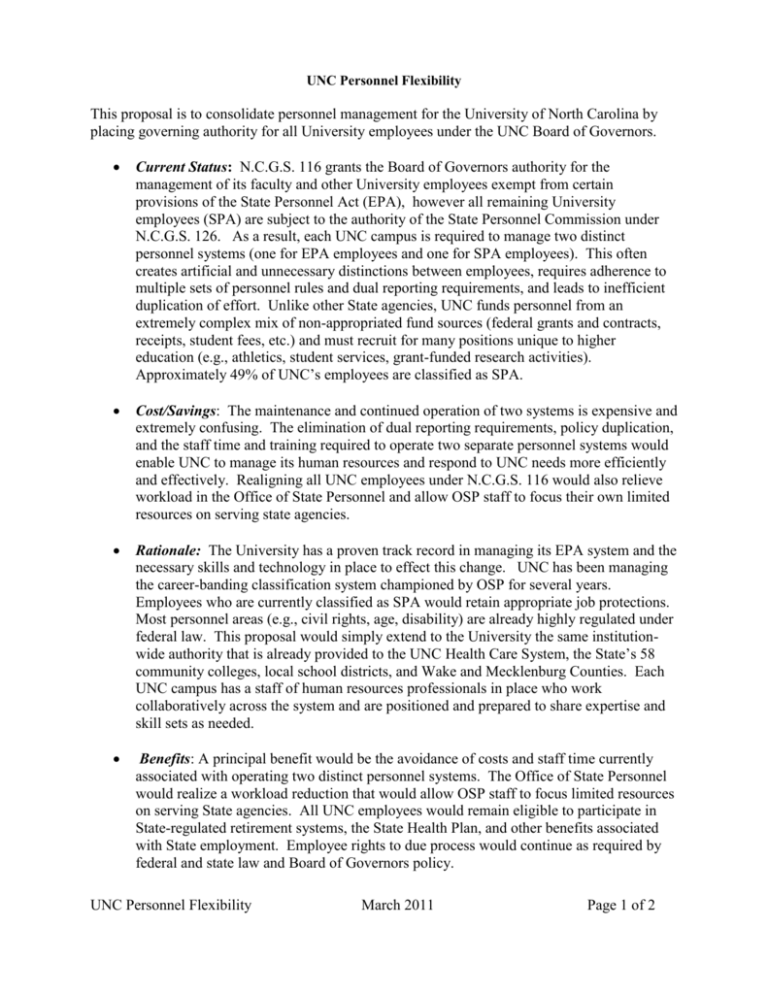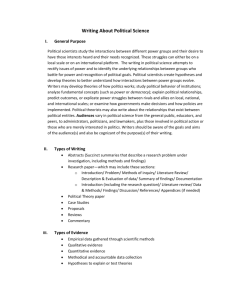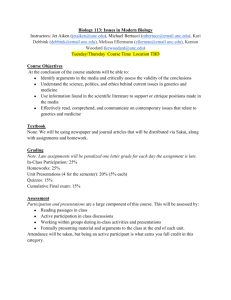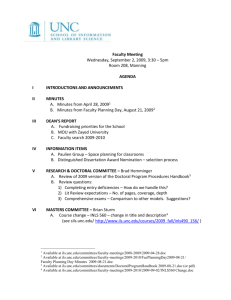The University of North Carolina is dedicated to the service of North
advertisement

UNC Personnel Flexibility This proposal is to consolidate personnel management for the University of North Carolina by placing governing authority for all University employees under the UNC Board of Governors. Current Status: N.C.G.S. 116 grants the Board of Governors authority for the management of its faculty and other University employees exempt from certain provisions of the State Personnel Act (EPA), however all remaining University employees (SPA) are subject to the authority of the State Personnel Commission under N.C.G.S. 126. As a result, each UNC campus is required to manage two distinct personnel systems (one for EPA employees and one for SPA employees). This often creates artificial and unnecessary distinctions between employees, requires adherence to multiple sets of personnel rules and dual reporting requirements, and leads to inefficient duplication of effort. Unlike other State agencies, UNC funds personnel from an extremely complex mix of non-appropriated fund sources (federal grants and contracts, receipts, student fees, etc.) and must recruit for many positions unique to higher education (e.g., athletics, student services, grant-funded research activities). Approximately 49% of UNC’s employees are classified as SPA. Cost/Savings: The maintenance and continued operation of two systems is expensive and extremely confusing. The elimination of dual reporting requirements, policy duplication, and the staff time and training required to operate two separate personnel systems would enable UNC to manage its human resources and respond to UNC needs more efficiently and effectively. Realigning all UNC employees under N.C.G.S. 116 would also relieve workload in the Office of State Personnel and allow OSP staff to focus their own limited resources on serving state agencies. Rationale: The University has a proven track record in managing its EPA system and the necessary skills and technology in place to effect this change. UNC has been managing the career-banding classification system championed by OSP for several years. Employees who are currently classified as SPA would retain appropriate job protections. Most personnel areas (e.g., civil rights, age, disability) are already highly regulated under federal law. This proposal would simply extend to the University the same institutionwide authority that is already provided to the UNC Health Care System, the State’s 58 community colleges, local school districts, and Wake and Mecklenburg Counties. Each UNC campus has a staff of human resources professionals in place who work collaboratively across the system and are positioned and prepared to share expertise and skill sets as needed. Benefits: A principal benefit would be the avoidance of costs and staff time currently associated with operating two distinct personnel systems. The Office of State Personnel would realize a workload reduction that would allow OSP staff to focus limited resources on serving State agencies. All UNC employees would remain eligible to participate in State-regulated retirement systems, the State Health Plan, and other benefits associated with State employment. Employee rights to due process would continue as required by federal and state law and Board of Governors policy. UNC Personnel Flexibility March 2011 Page 1 of 2 It is important to understand as well what employment rights and access would NOT be changed by this: Health insurance would not change – UNC employees would remain State employees eligible for the State Health Plan. Retirement - UNC employees would remain State employees eligible for state regulated retirement systems. Employee due process rights will be maintained in accordance with federal and state law and UNC policies, including matters related to discrimination among other areas. Employment policies already are highly regulated by Federal employment laws such as the Fair Labor Standards Act, Civil Rights Act, Age Discrimination in Employment Act, Americans with Disabilities Act, etc. All UNC employees would continue to be governed by these laws. All UNC employees will remain subject to several elements of the State Personnel Act such as Articles 5 (Political Activity) and 7 (Personnel Records privacy protection). Further, UNC will obviously continue EEO and Affirmative Action coverage, Veterans’ Preference in employment, and protection for reporting improper activities…also known as “whistle blower” protection. UNC General Administration Human Resources UNC Personnel Flexibility March 2011 Page 2 of 2






